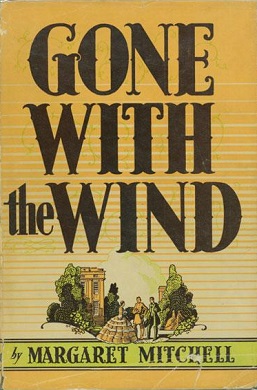Here's a little detour from the eighteenth century to talk about one of my long reads at the end of the year.I picked up Gone With the Wind for free. I have a feeling that when any institution using books as decoration, it’s free game to take those books and so I did that in a cafe in Soho. I decided to read it as I always read something large and engrossing in the run up to Christmas. Usually it’s a Dickens book but 2021 being my year of reading women, I decided to give Margaret Mitchell a go.
I was aware of the accusation of the book of being racist and I was alert to it as soon as I begun. What I found remarkable at first was the lengths the book went to, at least at its beginning, to position the reader very carefully. While this a story takes place in an inherently racist society and our point of view characters were all inherently racist in themselves, the reader is explicitly told not to accept their point of view unquestioningly. As each character is introduced, the narrative voice takes great pains to point out how unimaginative, unreflective and unthinking the characters are. The pre-war South is a utopia, but it’s a utopia created for (and in turn creating) selfish, arrogant idiots. They live in a society where the source of their riches are unexamined and the slaves are amusing childlike objects to be worked and taken care of. They are violent, finding it bad manners to hold a grudge when one shoots the other in anger and they whoop and holler into war without any thought of consequence.
The war itself shows reality seeping into this fool’s paradise. The people experience want and hardship for the first time but are still blinded by the notion of a Cause which they all pull towards. Interestingly, none of the characters really ask what the Cause is, that it is a Cause is enough. It’s the parts of the book following the war, during the Reconstruction where the positioning of the audience slips. It’s a long book, the reader spends a long time with the characters and Margaret Mitchell had been with them even longer, so the inevitable pull of sympathy tugs us all towards the characters and the narrator no-longer places the audience at a wry distance. From then on the book is undeniably racist, the narrator informs us that ‘lynching the negro seemed a sensible solution’, Black people are a threat and the KKK are represented as benighted heroes who are unfairly oppressed. We’re no longer encouraged to feel sympathy for the fools who have lost their deeply-rotten paradise, we’re encouraged to miss it too.
However, beyond a slide into Confederacy nostalgia, this is the story of a particularly remarkable protagonist, Scarlett O’Hara. She’s a horror; a narcissistic, narrow minded, selfish, psychopath. The beginning of the book makes this explicit, saying that she had no interest in what went on in other people’s minds, nor even any notion that other people may have their own minds. What’s more, the pressures of war and building herself up from nothing re-enforce her grasping, acquisitive amoral worldview and this makes her fascinating. I was always keen to know what she would do next, what taboo she may break or what person she’ll happily swindle to get what she wants. Scarlett cares for nobody. Her ‘love’ for Ashley, which motivates many of her actions seems to be little more than the fossilised envy at his rejection of her, not helped by his own weak-willed and prevaricating personality. Because she makes things happen, the reader roots for her even as she is not likeable in any way.
She meets her match in Rhett Butler, a cardsharp turned war-profiteer who is probably the most self-reflective and clear-eyed character in the book. Unlike almost every other character (including Scarlett) he thinks. What’s more, he has a moral compass, he cares for other people but his own shrewd pragmatism usually comes to the fore. If anything, his great weakness is in ignoring that pragmatism and pursuing a love for Scarlett. He spends much of the book saying the two are alike but he’s wrong, while he shares the broad, wry viewpoint of the early narrator, she is blinkered and narrow. Every time Rhett and Scarlett are together, the book lights up.
The other characters are well drawn; whether it’s the nervous Aunt Pittypat, the genial Mr Kennedy, the all-knowing Mammy or the blowhard Dr Meade - they all have their roles to play and it’s interesting to see how all the wider events affect them or not. I found Ashley the most loathsome character in the book because he never commits to anything but Melanie, his wife really was a well-drawn picture of quiet strength and dignity. I’d have wished that she had known about Scarlett and Ashley’s dalliance all along, she’d have seemed even stronger then.
The book is at its best when it presents the reader with powerful set pieces. The opening bbq at Twelve Oaks is one such scene, the party where Scarlett dances in her widow’s weeds, Melanie giving birth as Atlanta burns - even the comic scene where the men feign drunkenness to hide the fact they were at a KKK meeting. However, for each of these brilliantly presented scenes, there were pages and pages of exposition to show time passing and the reduced circumstances of the characters. These grew longer as the book progressed and it was also in these parts that the positioning of the reader shifted and the book became genuinely racist. These parts slowed the book down and soured the tone so much that it was not the engrossing, carry-me-away book I was hoping for and my enjoyment was rather lessened.



No comments:
Post a Comment